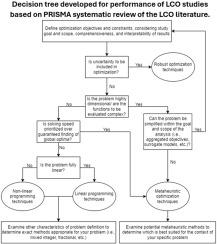Systematic review of the life cycle optimization literature, and recommendations for performance of life cycle optimization studies
IF 16.3
1区 工程技术
Q1 ENERGY & FUELS
引用次数: 0
Abstract
Life cycle optimization (LCO) refers to the integration of objectives calculated using a life-cycle based framework into mathematical optimization problems. Application of LCO may allow for substantial sustainability improvements in many industrial sectors, and provide valuable decision support towards achieving the UN Sustainable Development Goals. This study performed a PRISMA systematic review of LCO literature published between 2012 and 2023 with the goal of developing general guidelines for performance of LCO studies. Three hundred and one sources were reviewed to determine the industrial sector of the modeled system, the life cycle assessment framework used, how objective functions were defined, if uncertainty was included, and the optimization framework used. Results indicate a shift towards evolutionary-based optimization methods relative to previous reviews of the literature. Economic and environmental objective functions were most commonly assessed, while some studies have begun incorporating social objectives into their optimization. Based on the collected data, additional discussion was included related to choice of optimization framework, and definition of objective functions. The collected data and these additional discussions were used to develop a decision tree to aid practitioners in making methodological choices when performing LCO studies. This decision tree will help practitioners manage the trade-offs between the accuracy and efficiency of optimization methods based on the goals of their particular LCO study, and support increased uptake of LCO methodologies across industrial sectors. Increased uptake may provide significant value to researchers and policy makers by enabling investigation of potential sustainability improvement measures where all metrics are simultaneously optimized.

对生命周期优化文献的系统回顾,以及对生命周期优化研究绩效的建议
生命周期优化(LCO)是指将基于生命周期框架计算的目标整合到数学优化问题中。应用 LCO 可使许多工业部门的可持续发展得到实质性改善,并为实现联合国可持续发展目标提供有价值的决策支持。本研究对 2012 年至 2023 年间发表的 LCO 文献进行了 PRISMA 系统综述,旨在为 LCO 研究的绩效制定一般准则。共审查了 311 篇文献,以确定建模系统的工业部门、所使用的生命周期评估框架、目标函数的定义方式、是否包含不确定性以及所使用的优化框架。结果表明,与以前的文献综述相比,现在已转向基于进化的优化方法。最常评估的是经济和环境目标函数,而一些研究已开始将社会目标纳入优化。根据收集到的数据,对优化框架的选择和目标函数的定义进行了补充讨论。收集到的数据和这些补充讨论被用来开发一个决策树,以帮助从业人员在进行 LCO 研究时做出方法选择。该决策树将帮助从业人员根据其特定 LCO 研究的目标,在优化方法的准确性和效率之间进行权衡,并支持各工业部门更多地采用 LCO 方法。在同时优化所有指标的情况下,对潜在的可持续性改进措施进行研究,从而为研究人员和政策制定者提供重要价值。
本文章由计算机程序翻译,如有差异,请以英文原文为准。
求助全文
约1分钟内获得全文
求助全文
来源期刊

Renewable and Sustainable Energy Reviews
工程技术-能源与燃料
CiteScore
31.20
自引率
5.70%
发文量
1055
审稿时长
62 days
期刊介绍:
The mission of Renewable and Sustainable Energy Reviews is to disseminate the most compelling and pertinent critical insights in renewable and sustainable energy, fostering collaboration among the research community, private sector, and policy and decision makers. The journal aims to exchange challenges, solutions, innovative concepts, and technologies, contributing to sustainable development, the transition to a low-carbon future, and the attainment of emissions targets outlined by the United Nations Framework Convention on Climate Change.
Renewable and Sustainable Energy Reviews publishes a diverse range of content, including review papers, original research, case studies, and analyses of new technologies, all featuring a substantial review component such as critique, comparison, or analysis. Introducing a distinctive paper type, Expert Insights, the journal presents commissioned mini-reviews authored by field leaders, addressing topics of significant interest. Case studies undergo consideration only if they showcase the work's applicability to other regions or contribute valuable insights to the broader field of renewable and sustainable energy. Notably, a bibliographic or literature review lacking critical analysis is deemed unsuitable for publication.
 求助内容:
求助内容: 应助结果提醒方式:
应助结果提醒方式:


